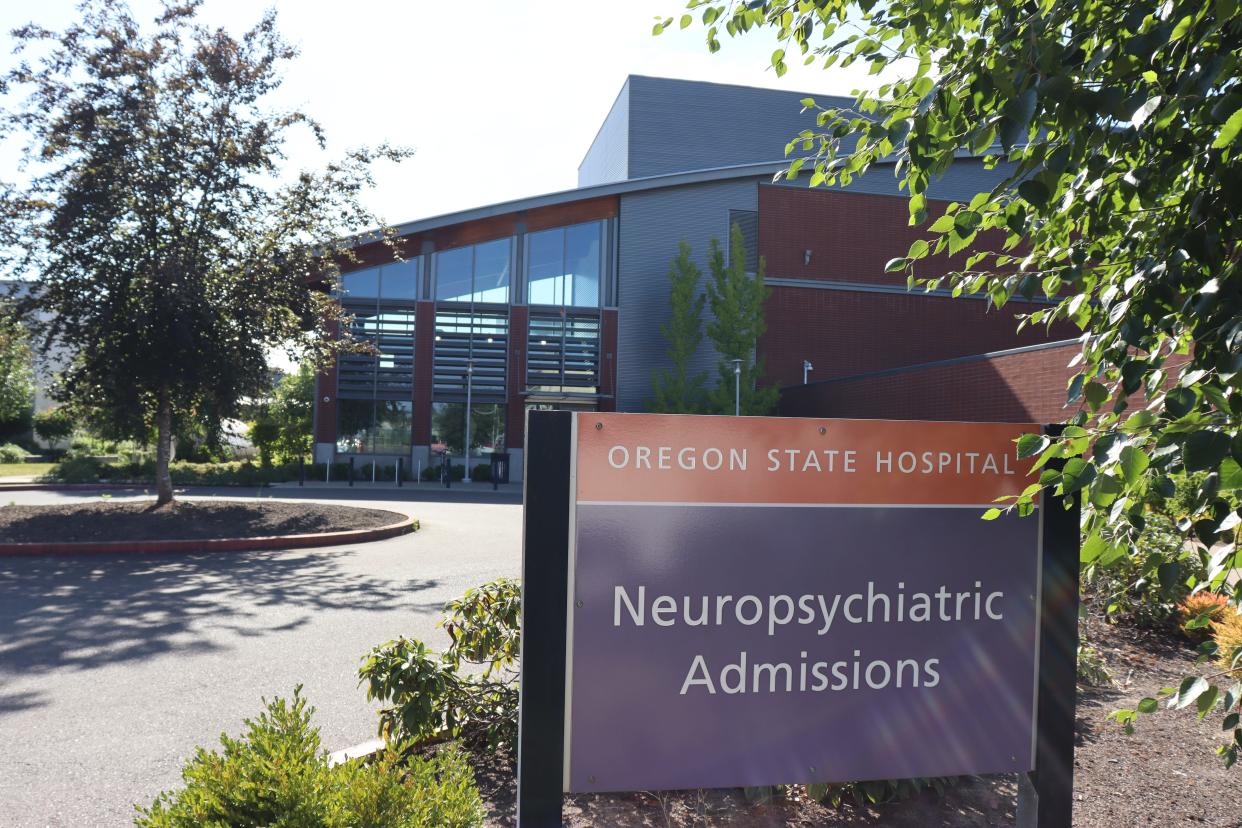Oregon State Hospital provides patients gender-affirming care

Patients at Oregon State Hospital's psychiatric treatment facilities in Salem and Junction City can now be referred to an in-house team for gender-affirming care treatment such and counseling and hormone therapy.
There are 13 members of the Gender Expansive Care and Organizational Support team, or GECOS, including clinicians, nurses, nurse practitioners, psychologists, therapists, a peer recovery specialist and a trans social worker, available for patients.
GECOS is there not only to meet the needs of transgender and gender-diverse patients but to provide education to employees on how to provide appropriate care and support to patients and coworkers who identify as a part of the LGBTQ+ community.
Dr. Sara Walker, chief medical officer of the hospital in Salem, said there previously were no policies on how to best treat patients who wanted gender-affirming care, so staff determined how to best meet their needs on a case-by-case basis.
There has always been a patient need, Walker said, and Oregon State Hospital was utilizing a lot of resources to get patients care outside of the hospital. Now, treatment except for surgical procedures is done at the hospital.
“It really was past time for us to develop our own sort of internal ability to do this work because the patient need was noticeably increasing,” Walker said.
Identifying as a gender different from the one assigned at birth but not being able to express that causes distress, Walker said. Transgender individuals show elevated rates of suicidal ideation in comparison to cisgender individuals, so having access to gender-affirming care can be lifesaving.
“If I feel like I am having to pretend to be another person all day, every day, and I don't get to be the person that I actually am in my own head, that's incredibly, incredibly distressing,” Walker said.
And these patients experience that distress in addition to an active mental illness.
Walker said many of the patients who have already received care have said it is the first time they have ever felt safe enough to talk about their gender identities.
“It's part of our responsibility as a hospital to create a sense of psychological safety so that people can tell us things that are true about themselves,” she said.
Care team in action
In order to receive gender-affirming care or education from the GECOS team, an employee or patient with the help of an employee fills out a referral form with six options for the types of care or support they can receive.
These include a consult, consult and assessment, resources, intervention recommendations, training and education for staff, and gender-affirming hormone treatment.
Walker said there has been a lot of interest from staff who are seeking to create a more welcoming culture and meet the needs of all patients.
They also have created “badge buddies” that are available to any employee who wants them. The badge buddies have a pride flag on one side and a trans pride flag on the other side to show LGBTQ+ patients they have a safe person to talk to.
They have made 800 badge buddies so far, Walker said.
There also is an internal database with resources available for employee education, as well as a binder on every unit with additional resources for what to do in various situations.
If a patient is referred to the team, they must first receive a full psychological evaluation to see how psychiatrically stable they are.
A patient must be deemed stable enough to make life-altering decisions such as consenting to hormone therapy. Chosen names and pronouns are used regardless of how symptomatic a patient is.
“We assess the person's capacity to make that decision. Do I understand the ramifications of accepting this treatment? Do I understand the risks of the treatment,” Walker said.
Most people can tell you their gender identity even when they are very symptomatic, she said.
“Most folks who are gender diverse, it's not something that springs upon them very late in life,” she said.
If a patient enters the hospital and already has been receiving hormone therapy, the treatment continues during their time at the hospital.
The social worker on the GECOS team also ensures patients continue to have access to the treatment they were receiving at the hospital when they are discharged.
A new path forward
Walker said not all staff and patients are completely “sold on” the idea that gender-affirming care is something the hospital should be focusing on.
“That's an educational opportunity,” said Walker, to gain knowledge and experience on different perspectives.
Regardless of how an employee feels about the new program, using chosen names and pronouns is required.
The hospital’s journey to creating a more welcoming environment and expanding access to care with GECOS is just beginning, and Walker said she is happy it is finally happening.
Sydney Wyatt covers healthcare inequities in the Mid-Willamette Valley for the Statesman Journal. Send comments, questions, and tips to her at SWyatt@gannett.com, (503) 399-6613, or on Twitter @sydney_elise44
The Statesman Journal’s coverage of healthcare inequities is funded in part by the M.J. Murdock Charitable Trust, which seeks to strengthen the cultural, social, educational, and spiritual base of the Pacific Northwest through capacity-building investments in the nonprofit sector.
This article originally appeared on Salem Statesman Journal: Oregon State Hospital provides patients gender-affirming care

